The Civil War was more than just a war between brothers; it was a war of ideas. Recognizing that music is one powerful way to convey an idea or communicate about a political situation, Union supporters used music to advance the Union cause during the Civil War, commissioning, composing and publishing empowering marches and prideful anthems such as “The Battle Hymn of the Republic” or “We Are Coming Father Abraham 300,000 More”. In the war, the latter was a call to arms for the North and helped solidify the army as well as invoke their beloved president in the name of the struggle. The Confederacy also produced their share of marches and anthems, but perhaps most intriguing was their use of musical parody. The song “We’re Coming Fodder Abraham: We’re Coming-’in a Horn’” makes a complete mockery of the northern piece “We Are Coming Father Abraham 300,000 More”. In the midst of a raging ideological war, this parody undermined northern strength and helped create a sense of southern unity. Through the use of impactful lyrics and pro-South propaganda, this piece offered a satirical perspective on the North’s famous recruiting song in an attempt to preserve southern ideals in a time of hardship both during and after the war.
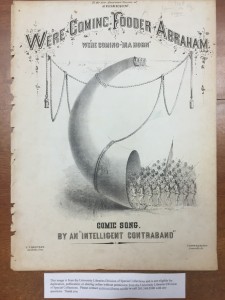
Composer and Producer History
The University of Alabama’s W.S. Hoole Special Collections Library holds a lithograph copy of the musical score “We’re Coming Fodder Abraham: We’re Coming-in a Horn”. The piece was originally published in 1863 but Hoole’s lithograph is from a later edition published in 1865 in Louisville, Kentucky by Tripp and Gragg, a publisher whose history and further identification have been lost to the mists of time. The composer is listed as “An Intelligent Contraband”–clearly not a real name but one that conceals the true identity of the composer and makes a joke of “contraband” African American slaves who had fled the South and then joined the army to fight for the Union. The song was composed in Nashville, Tennessee, sometime around 1863. Given that Nashville had been taken and was occupied by Union soldiers just prior to this song’s publication, one can easily imagine that the satire gives free expression to the anger and frustration felt by southerners who experienced that period of occupation.
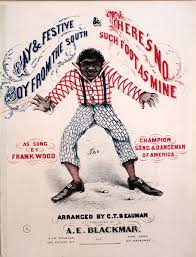
C. T. Beauman was a comedic composer to some extent, with at least one other satirical song publication to his name: “Gay and Festive Boy from the South” includes lyrics such as “go away ‘mancipation and come back old plantation”, and features a cover with a garish and demon-like depiction of a young African American child (Beauman).
Origins of the Text
The original “We Are Coming Father Abraham” (parodied in “We’re Coming Fodder Abraham”) began as a poem by James Sloan Gibbons, a Quaker, economist, and abolitionist. The poem appeared in the New York Post in response to Lincoln’s call for troops in 1862, as volunteer numbers had decreased drastically. Six different composers quickly set the poem to music; however, Luther O. Emerson composed the most popular version, which came successfully to publication. The musical setting of this poem was published by Oliver Ditson & Company, a Boston based firm that published many Union war songs including “The Battle Hymn of the Republic.” “We Are Coming Father Abraham” ballooned in popularity, becoming the anthem for recruitment with the repeated chorus, “We are coming Father Abraham/ 300,000 more” and was imitated, adjusted and parodied over time. One version changed 300,000 to 600,000 because it was not believed that 300,000 troops would be enough to win the war. One parody mocked the national banking system organized by Congress in 1863, stating, “We’re Coming Father Abra’am, One hundred thousand more, / Five hundred presses printing us from morn till night is o’er;/ Like magic, you will see us start and scatter thro’ the land/To pay the soldiers or release the border contraband.” Eventually, the song was parodied by C.T. Beauman in “We’re Coming Fodder Abraham.”
A Parody of Events
An essential component of any parody is to poke fun at current events, and “We‘re Coming Fodder Abraham” is no exception. The piece makes very specific references to recently established laws and events. One example is “De Conscript bill” in the second verse. This is a direct reference to the Enrollment Act passed by Congress in 1863. The purpose of this law was to streamline the draft process to compensate for the number of volunteers lost in 1862. This law required a quota of soldiers, any man from the ages of 20-45, from each congressional district. The quota had to be made and was a combination of volunteer and draftees, so if a district had more volunteers it was not required to draft as many men.
The parody is also a direct response to the Emancipation Proclamation, an executive order signed by Lincoln in 1863. Contrary to popular belief, the Emancipation Proclamation did not in actuality free any slaves; rather, it freed slaves in the Confederacy, which Lincoln had no jurisdiction over, and actually allowed Missouri, Kentucky, and Maryland to keep their slaves. Because fugitive slave laws were still in effect in 1863, Union generals who accepted runaway slaves as soldiers were actually breaking the law because they were not returning these slaves to their owners. Therefore, Lincoln signed the Emancipation Proclamation so that slaves could fight in the Union army while his generals stayed within the confines of the law.
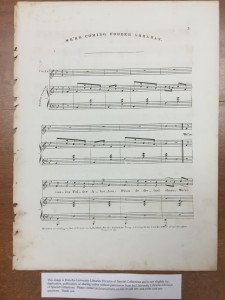
Primary Source Observations and Language Analysis
The first thing one is drawn to when looking at the piece is the cover of “We’re Coming Fodder Abraham” which includes a host of iconic images. The largest image on the front cover portrays a battle horn with an army of African American soldiers, the “contraband” who have joined the Union army, marching into it while a much smaller army is emerges at the top. This image suggests that the army is being cut down to size, an idea that is reiterated by the use of “fodder” in the title. As a testament to the cleverness of the lyricist, the word “fodder” both evokes both the slave dialect for the word “father” (reinforcing the idea that the piece was written by a “contraband”) and communicates the idea that the new influx of African American soldiers were mere fodder for the cannons of the Confederacy. Under the title of the song the lyricist includes the phrase “We’re coming-‘In a Horn’”. “In a horn” in the era was used as a phrase to direct the opposite of something, almost in the same manner as sarcasm is used today. For example, “that boy jumped over the car, in a horn”, would actually mean that the boy did not jump over the car, and imply that the feat would be impossible. Therefore, “we’re coming-in a horn” is a sarcastic statement, expressing doubt that the “contraband” soldiers would pass muster or be useful in war. (Bartlett).
The language style used in “We’re Coming Fodder Abraham” is very old-timey and colloquial. Phrases written as “De Conscript bill passed de house” and “Dis rebellion must be crushed / we’re de boys to do it” demonstrate “the” and “this” sounded like when spoken by an uneducated slave. This intentionally reinforces the concept that the piece was written by an “intelligent contraband”. The heavy use of the word “nigger” was also very common back during the Civil War.
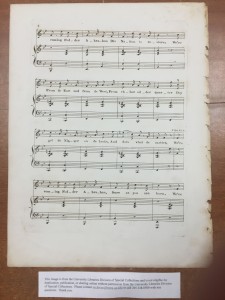
Some lyrics that demonstrate specific elements of the intention behind this song are found in the third and fourth verses. For example the final line of the piece states, “You cant fool de Nigger longer/about de jubilo.” “Jubilo” in this line is a direct reference to the Year of Jubilee, a hoped-for time in which slaves would finally be free. This line asserts that this Jubilee would never come, and that slavery would still exist as an institution, and thereby the South would retain its identity and economy as a region of rich plantations dependent on slave labor. “Jubilo” could also be an abbreviation for jubilation, or joy, and the writer of this piece could be letting us know that the African Americans will not be responding to Abraham Lincoln’s call to arms. So, the slaves do not believe President Lincoln when he says that the war will end with their support. Another line crucial to the author’s motive states, “We’re all a lot of Contrabands / As stubborn as a Mule.” This clearly points to the perspective behind this song. The author wants to write the piece in the voice of an African American slave in order to highlight the stereotype of the lazy, uneducated, vilified slave. T
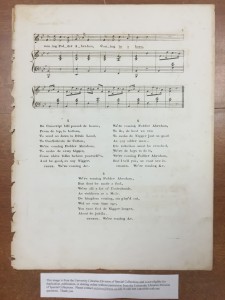
Conclusions
“We’re Coming Fodder Abraham” offers insight into the harsh racism, regional attitudes, and the politics of the Civil War era. It makes several references to legislation being enacted in 1863 and is a response to the occupation of Nashville and the Civil War in general. By pandering to the viewpoints of rich, white, Southern aristocrats, the piece displays how the South felt about African American soldiers, the war effort of the North in the “War of Northern Aggression,” and the war effort of the Confederacy. Many of these topics are very controversial, giving “We’re Coming Fodder Abraham” relevance and historical merit, making it a largely unappreciated piece that provides invaluable insight into the complicated politics of the Civil War.
Works Cited
Bartlett, John Russell. Dictionary of Americanisms. A Glossary of Words and Phrases, Usually Regarded as Peculiar to the United States. New York: Bartlett and Welford, 1848. 203. Print.
Cornelius, H. Steven. Music of the Civil War. Westport, CT: Greenwood Press, 2004. Print.
C.T. Beauman. Gay and Festive Boy from the South. New York: A.E.Blackmar, N.d. Print.
David M. Kennedy, Lizabeth Cohen, Thomas A. Bailey The American Pageant 13th Edition. Wadsworth, Cengage Learning, 2006 . Music of the Civil War Era” by Steven H. Cornelius pages 19, 51-52. Print.
Intelligent Contraband. “We’re Coming Fodder Abraham: We’re Coming-“in a Horn” : Comic Song”.1863 Louisville, Ky: Tripp & Gragg, 1865. Print.
Oldroyd, Osbourne H. The Good Old Songs we used to Sing, ’61 to ’65. Washington D.C.: O.H. OLDROYD, 2007. Print.
Pickering, F. Samuel. May Days. Iowa City: University of Iowa Press, 1941. Print.
Silber, Irwin, and Jerry Silverman. Songs of the Civil War. New York: Columbia University Press, 1960. Print.
Steven Diklich, Chad Juergensen, Adam Parks